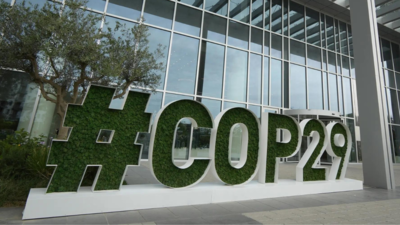[ad_1]

India voiced strong concerns regarding developed nations’ reluctance to engage meaningfully in discussions about supporting climate initiatives in developing countries at the COP29 conference in Baku while highlighting that addressing climate change requires substantial financial and technological assistance.
India, during the Mitigation Work Programme’s closing plenary on Saturday, highlighted how developed nations, despite their historical responsibility for greenhouse gas emissions and greater resources, have consistently postponed climate action.
“We have seen no progress in matters critical for developing countries (during the last week). Our part of the world is facing some of the worst impacts of climate change with far lower capacity to recover from those impacts or to adapt to the changes to the climatic system for which we are not responsible,” said India’s deputy lead negotiator Neelesh Sah.
Sah clarified that the MWP should function as a supportive mechanism, not a punitive one, whilst respecting each nation’s sovereignty in establishing climate objectives based on their specific requirements and circumstances.
He said that without proper implementation support, including financial assistance, technology, and capacity-building, developing and low-income nations cannot effectively reduce greenhouse gas emissions or adapt to climate change impacts.
“How can we discuss climate action when it is being made impossible for us to act even as our challenges in dealing with the impacts of climate change are increasing?” the Indian negotiator said.
India pointed out that developed nations, despite having the greatest capability for climate action, had consistently altered targets, delayed implementation, and consumed an excessive portion of the global carbon budget.
India further stated that developing nations now face the challenge of meeting development needs whilst dealing with a diminishing carbon budget and escalating climate change effects. They criticised the lack of ambition from developed nations in both mitigation efforts and providing implementation support.
“The bottom-up approach is being attempted to be made into a top-down approach, in turn attempting to turn the whole mandate of the MWP and the principles of the Paris Agreement upside down. For the past week, at the ‘finance COP’, we have been frustrated by the unwillingness of developed countries to engage on this issue,” Sah said.
At COP29, nations are deliberating on the operational aspects and focus areas of the MWP, which was established at COP27 in Sharm el-Sheikh, Egypt, to support mitigation efforts.
The MWP discussions remain contentious, with developing nations emphazizing its intended role as a platform for sharing emission reduction strategies and experiences.
These nations maintain that the programme was not intended to establish new obligations or mandate specific actions from any country.
Conversely, developed nations are advocating for the MWP to encourage more robust and immediate action across all countries.
The primary focus of this year’s UN climate discussions centers on establishing a new climate finance framework to assist developing nations in emission reduction and climate adaptation.
Developed nations’ 2009 commitment to provide $100 billion annually by 2020 for climate action in developing countries was not fulfilled until 2022.
Approximately 70 per cent of the provided funds were loans, creating additional financial pressure on low-income countries already affected by climate change. As climate effects intensify, developing nations require annual financial support of at least $ 1.3 trillion.
These nations insist this funding should originate from developed countries’ governments, rather than private sector involvement, which operates on profit motives and lacks UN climate process accountability.
Limited progress has been achieved in discussions, as developed nations advocate for transforming the climate finance package into a “global investment goal” encompassing all funding sources.
“Climate finance cannot be changed into an investment goal when it is a unidirectional provision and mobilization goal from the developed to the developing countries. The Paris Agreement is clear on who is to provide and mobilize the climate finance – it is the developed countries,” India’s lead negotiator Naresh Pal Gangwar said on Thursday during a high-level dialogue on climate finance.
The EU, US, and other developed nations assert that significant changes in the global economy since 1992 necessitate contributions from newly prosperous nations like China and certain Gulf states towards the new climate finance objective.
Developing nations interpret this as an attempt to redirect responsibility from historical industrialization beneficiaries who have contributed most significantly to greenhouse gas emissions.
They contend that expecting contributions from nations still addressing poverty and infrastructure challenges whilst facing worsening climate impacts contradicts equity principles.
The anticipated withdrawal of the US and Argentina from the Paris Agreement has dampened negotiator spirits at COP29.
[ad_2]
Source link


 Better health
Better health